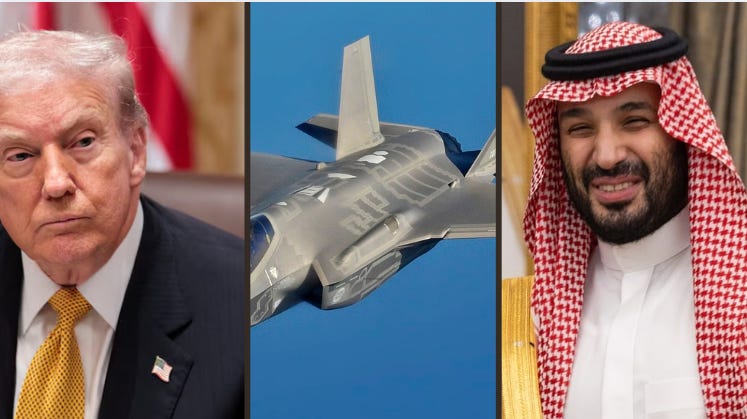Israel Pushes Trump to Tie F-35 Sale to Saudi Normalization
Israeli officials informed the Trump administration that they would not object to Washington transferring the advanced aircraft to Saudi Arabia—as long as the sale is conditioned on normalization
United States, PUREWILAYAH.COM — “Israel” has urged the Trump administration to tie any U.S. sale of F-35 fighter jets to Saudi Arabia directly to full diplomatic normalization between Riyadh and Tel Aviv.
According to Axios, Israeli officials privately informed the Trump administration that they would not object to Washington transferring the advanced aircraft to Saudi Arabia—as long as the sale is conditioned on normalization.
“We told the Trump administration that providing Saudi Arabia with F-35s must be conditional on normalization, and that selling the planes without a political concession would be a mistake and would cause harm,” an Israeli official said.
The position comes ahead of Saudi Crown Prince and Prime Minister Mohammed bin Salman’s planned visit to Washington, where he is expected to meet U.S. President Donald Trump.
Washington Meeting to Center on Security Pact, F-35 Package, and Normalization Push
The White House discussions will reportedly focus on:
the proposed U.S.–Saudi security pact,
the long-running negotiations over the F-35 package,
and Washington’s push to secure a breakthrough in Israeli–Saudi normalization.
Trump has been pressuring Riyadh to move toward normalization “fairly shortly,” telling reporters aboard Air Force One that he plans to raise the issue directly with MBS during their meeting. Trump also confirmed he is considering a weapons deal that includes F-35 jets for Saudi Arabia.
Israeli Conditions and Regional Calculations
Israeli officials emphasized to Washington that any transfer of F-35s to Saudi Arabia must be linked to full diplomatic normalization. One official warned that providing such advanced aircraft without political concessions would be counterproductive.
Another Israeli official described Tel Aviv’s position as “strongly opposed” to supplying F-35s to Türkiye, while being “less concerned” about Saudi Arabia receiving them if included in a broader regional security framework tied to normalization.
U.S. officials told Axios that despite hopes for progress, significant gaps remain—particularly Riyadh’s insistence that Israeli Prime Minister Benjamin Netanyahu commit to a “credible, irreversible, and time-bound path” toward establishing a Palestinian state.
Netanyahu has refused to make such a commitment.
Israeli officials said they hope Trump will pressure MBS to soften these conditions and open the way for direct trilateral talks between the United States, Saudi Arabia, and “Israel.”
Qualitative Military Edge Concerns
The Israeli military is currently the only force in West Asia operating F-35 jets.
Any U.S. decision to supply the aircraft to Saudi Arabia would alter the region’s military balance and impact Washington’s pledge to maintain Tel Aviv’s Qualitative Military Edge (QME), a doctrine formalized by the U.S. Congress in 2008.
Israeli officials noted that additional U.S. guarantees would be required if the deal proceeds, citing Saudi Arabia’s geographic proximity. “It takes minutes for an F-35 to fly from Saudi Arabia to Israel,” one official said, adding that Tel Aviv may demand restrictions preventing the jets from being based in western Saudi Arabia.
UAE Precedent Raises Doubts Over Saudi Expectations
The analysis points to similarities with the UAE case in 2020, when “Israel” agreed to a proposed F-35 sale as part of the normalization accords.
However, the deal ultimately collapsed after Washington demanded sweeping operational limits and security conditions that Abu Dhabi refused to accept.
U.S. intelligence agencies have expressed concerns that transferring F-35 technology to Saudi Arabia could expose the aircraft’s systems to China due to expanding Saudi–Chinese security and technology cooperation.
Pentagon officials continue to seek strict safeguards, despite Trump’s push to finalize a multibillion-dollar agreement for 48 aircraft.
This dynamic has created apprehension in Riyadh that—like the UAE—it could make substantial political concessions, only to have Washington obstruct or delay access to the advanced weaponry it seeks. (PW)


